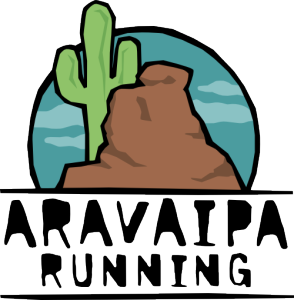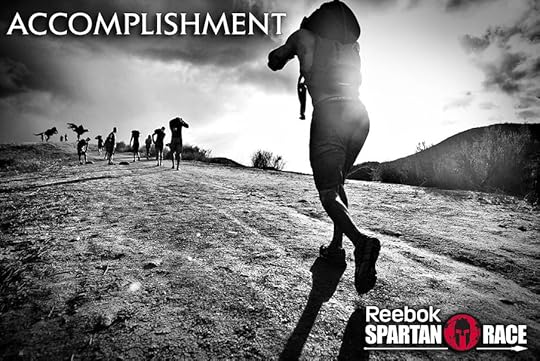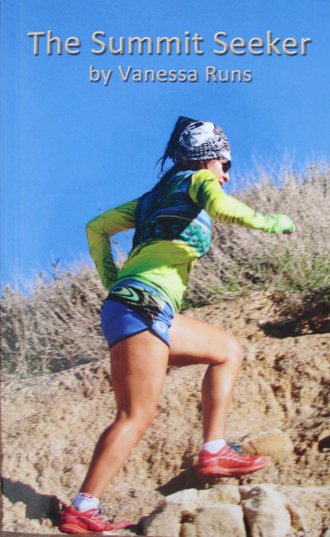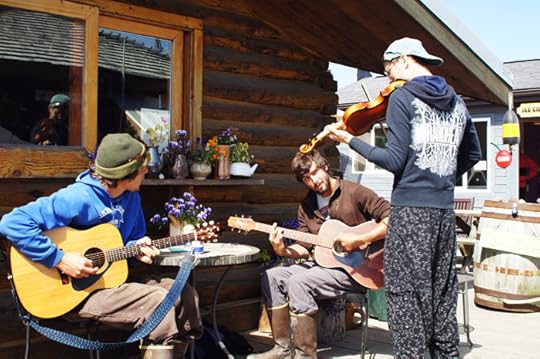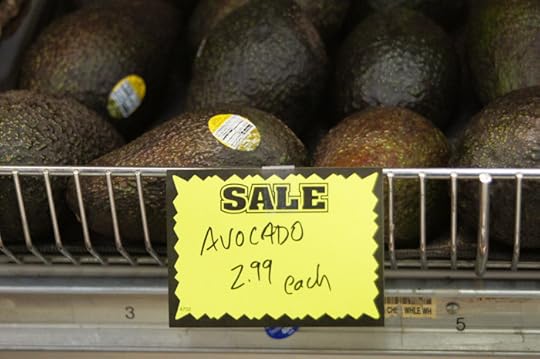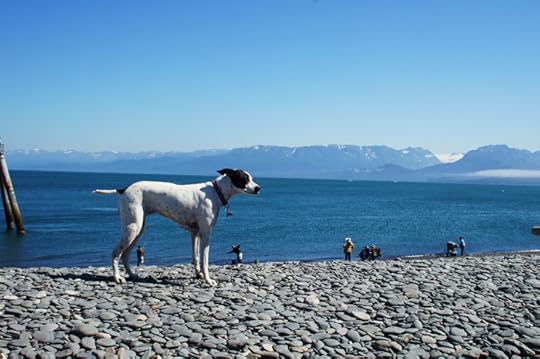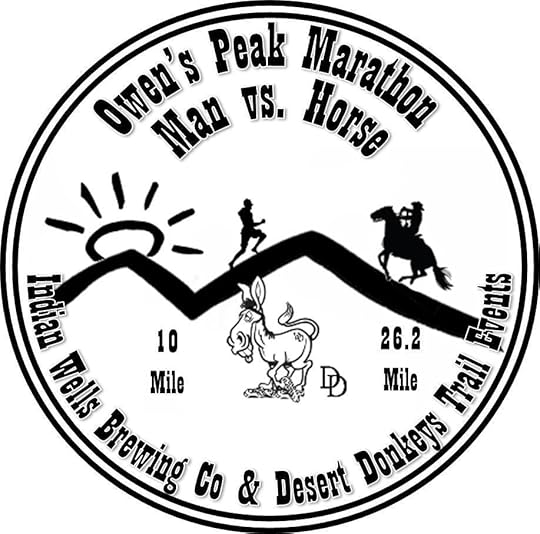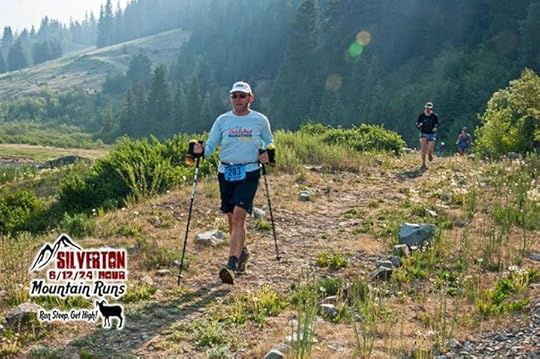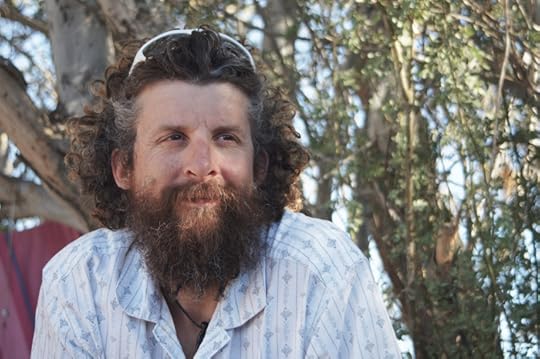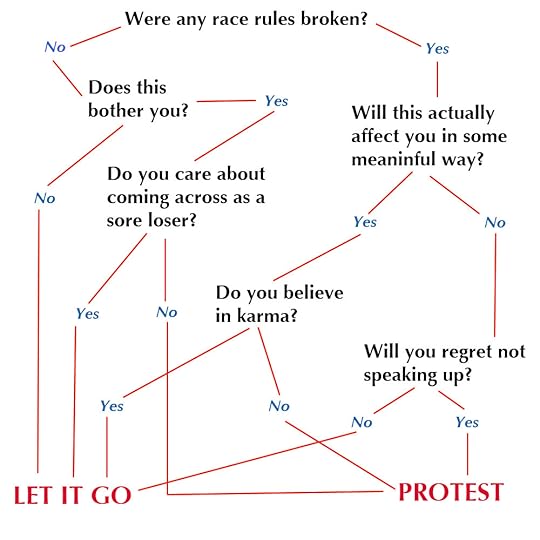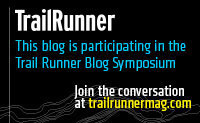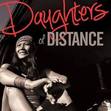Vanessa Runs's Blog, page 15
September 13, 2013
Black Canyon Trail 100K Race Entry Giveaway

Aravaipa Running is launching the inaugural Black Canyon 100K this winter, a trail point-to-point ultra from Spring Valley to New River, Arizona. They have generously offered up a free entry for a giveaway ($110 value).
The Coury brothers behind Aravaipa Running are well-known for organizing a series of exceptional races such as Across the Years and Javelina Jundred. Their events are must-dos for anyone who has not yet experienced some Coury magic (and for those who know it well!)
RACE STATS
Date: February 15, 2014
Terrain: Single track, non-motorized jeep trail, old stagecoach route
Start Location: Mayer High School, 17300 East Mule Deer Drive, Mayer, AZ
Finish Location: Emery Henderson Trailhead, New River Road, 3.0 miles west of I-17
Perks:
Well-stocked aid stations every four to eight miles
Post-race food (soup, fresh fruit) & socializing
More Info
UltraSignUp Registration Link
Facebook Event Page
TO ENTER
Simply leave a comment below answering the following question:
“What mental trick(s) do you use to dig deep
when you are struggling on a run?”
For additional entries, share this post on Facebook, Twitter, your blog, or anywhere else online. Each additional share = one extra entry. For example, if you comment below as well as share on Facebook and Twitter, that’s 3 entries. Remember to mention where you shared in the comments below.
The winner will be chosen at random on September 30th and contacted directly.
You May Also Enjoy:
Across the Years 24 Hours Race Report
****
Check out my book: The Summit Seeker


August 11, 2013
Spartan Race Entry Giveaway
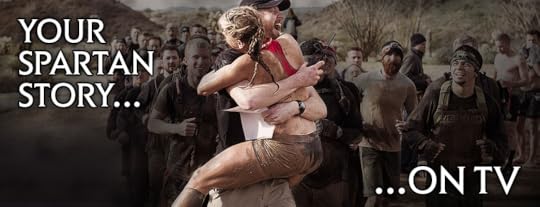
Spartan Race has partnered with NBC Sports to bring obstacle racing to television, and to celebrate we are offering a free race entry valid for any open heat in any 2013-2104 Spartan Race in the Continental US.
NBC will be filming eight professional athletes and four everyday Spartans at the Spartan Race World Championships in Killington, Vermont next month on September 21st for a 90-minute TV special. Registration for this race is still open.
Spartan has also launched a Get On TV campaign in which you can submit a story about how training and racing in a Spartan Race has transformed your life for a chance to be featured on this special.
WIN A FREE ENTRY
This entry is valid for ANY open Spartan race in the Continental USA. Check out the Spartan schedule for a race near you.
To win, simply leave a comment on this post answering the question: “What is one obstacle in your life that you are proud to have overcome?”
If you share this giveaway on Facebook, Twitter, your blog, or any other form of social media, you get an additional entry. For example, if you share on Facebook AND Twitter, that’s two extra entries. (Leave a separate comment telling me where you shared.)
You can also use this URL to generate a 15% off code for any Spartan race.
The winner will be chosen randomly on August 18, 2013 and contacted directly.
Good luck!
You May Also Enjoy:
10 Overlooked Rights Worth Fighting For
The Burpee Challenge: 3 Things I Learned and 2 Surprises
****
Check out my book: The Summit Seeker


August 9, 2013
National Book Lover’s Day Giveaway for The Summit Seeker
In celebration of National Book Lover’s Day, I am holding a one-day giveaway for my book, The Summit Seeker.
Check out the Amazon description and reviews HERE.
Check out the blog reviews and other coverage HERE.
TO ENTER
To win a free copy, simply:
1. Follow The Summit Seeker on Facebook HERE if you don’t already.
2. A summit is a goal we aspire to. Leave a comment below telling me your main goal for the month of August. Running, athletic, recovery, mental… anything goes.
If you share this giveaway on Twitter, Facebook, your blog, or any other social media, you get a free entry. Be sure to mention in the comments section where you shared.
The winner will be chosen at random tomorrow and contacted directly.
PS – It’s pouring rain in Anchorage, Alaska today–the perfect weather for curling up with a great book.
Read on and run free!
You May Also Enjoy:
10 Overlooked Rights Worth Fighting For
Happy Hoboversary! Stats From One Year Later
Answering the Call of the North
****
Check out my book: The Summit Seeker


August 6, 2013
Why We Need Nomads
I recently stumbled on a Quora question in which the writer was thinking about quitting his job and selling his possessions to travel the world. He gave a brief description of himself (single, in his 20s, a job but no career), and asked whether he should go for it.
The resounding answer was yes, but not necessarily because it was a respectable lifestyle. Rather, because he was young enough to get away with it. Because he still had time to build a career, a family, and a real life. Because now was the time to get the travel bug out of his system.
I was glad to read the encouragement and travel tips he received, but couldn’t help wonder: what if a 40-something man with three young children also wanted to become a nomad?
A nomad is someone who travels extensively, with no real home to speak of other than the wide-open road. They usually carry all their possessions with them, and earn little to no income.
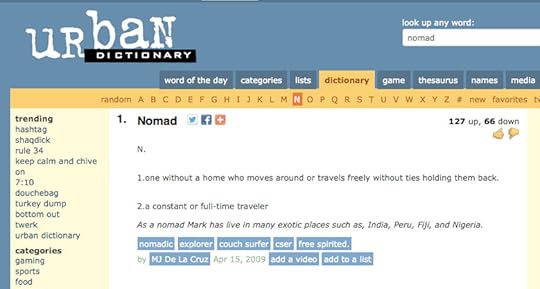
Truth from a reliable source
Nomadic travel is tolerated if you are young, responsibility-free, and trying to find yourself, but only for a pre-determined amount of time. Why isn’t travel—apart from age and status—worthy of pursuing in itself as a respectable (not just fulfilling) way of life?
The most common question we get from people we meet since hitting the road full-time is: “How long are you traveling for?”
We still aren’t sure how to answer that. “Um… forever?” Shacky says, and then we explain that we live this way. It’s not a vacation. It’s not a year-long project.
People are puzzled by this concept. Our contact with them usually expires before they grasp it, and as we walk away I can almost hear the wheels turning in their heads with a million questions.
Online, people have fewer questions and more opinions. We are called freeloaders or spoiled by people who don’t know us but dislike the concept of full-time travel. Some accuse us of contributing nothing to society, or worse—burdening it.
This isn’t surprising when you consider that although this lifestyle has many benefits, they are often described as personal fulfillments rather than contributions to the real world, giving us the reputation of takers, not givers.
What benefits do nomads bring to society? Do we really need them?
The answer is a resounding yes. As much as we need lawyers, doctors, and construction workers—we need nomads. Here’s why:
Social Benefits
A few weeks ago Jessica Kurti posted the following story on my Facebook wall:
Transported my first hitchhikers today… was AWESOME. Two ‘through hikers’ doing the entire Pacific Crest Trail. Gave them a lift to Sisters, Oregon, where they were going to eat, run errands, and meet a ‘trail angel’ who would give them a lift to the next trailhead. So, I would like to say THANK YOU, to you, Shacky, Honey Bird and Crockett (their trail names). I learned so much about what is possible! Although I love to help people, I rarely would consider picking up hitchhikers (in this country at least as a single female). SO GLAD I DID. And I wish *all of us* continued safe journeys and amazing adventures ahead! #cannotbelievethisismylife #LIVINGTHEDREAM
Much love from Bend, Oregon (started in Florida). Keep on keeping on!
She was thanking me because I had previously written about our experiences picking up hitchhikers, commenting on how unfounded our society’s fear of hitchhiking actually is.
Nomads are more trusting of strangers than your average person, probably because they spend a large portion of their time talking to strangers. They discover that strangers (and people in general) are inherently good, hospitable, and eager to help. As a result, nomads serve as society’s connectors.
Nomads will:
connect people with similar interests to each other
connect people with resources to people in need
connect strangers in close proximity
connect Facebook friends in real-person contact
Nomads not only make frequent connections, but also improve the quality of those connections. The transition isn’t from stranger to acquaintance, but from stranger to good friend. Nomads have the time to really listen and understand the people they meet. They are not rushing to their next appointment of thinking about what they will cook for dinner. Their attentions are focused on the stories and experiences of others. Nomads allow us to feel heard and to feel like our stories matter.
Nomads connect us to each other, re-establish our faith in humanity, and dispel unfounded social stigmas.
Intellectual Benefits
I first learned about Maslow’s hierarchy of needs in a high school Psychology class. As a child of poverty, it was one of my first introductions to the concept that there may be something more to life than living to fulfill our basic needs of food and shelter.
Abraham Maslow developed this theory in his 1943 paper describing the stages of human growth. While other psychologists of his time were studying the mentally ill, Maslow examined the healthiest one percent of a college student population. He named people like Albert Einstein, Eleanor Roosevelt, and Frederick Douglass as examples he studied. Here is the hierarchy:
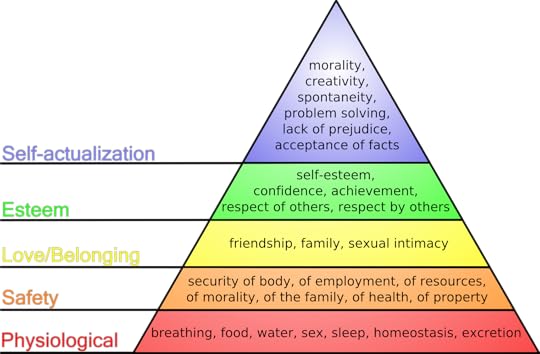
Source: Wikipedia – https://en.wikipedia.org/wiki/Maslow%27s_hierarchy_of_needs
Our current society over-emphasizes the bottom two levels at the expense of the top three. Once we have met our basic needs of food, shelter, and security, we are pressured to over-develop those benefits: a bigger house, a nicer car, giving our kids everything they could possibly want (not just what they need). To achieve this, we sacrifice the higher levels of friendships, self-esteem, and the freedom to be creative.
Nomads embody the opposite, and as a result they balance society. We embrace the bare minimum when it comes to food, shelter, and security in exchange for the higher opportunities of self-actualization. We have the freedom to immerse ourselves into areas that the rest of society has little time for: volunteering, extensive travel, year-long projects with little to no financial return, and time-consuming works of art.
We learn from the nomad that happiness comes in different shapes, despite society’s insistence that more money equals more freedom. We see nomads working as their own bosses, or exploring their true passions. Watching them gives us the courage to do the same.
Nomads change the way we think and view the world.
Environmental Benefits
Can you brush your teeth with two sips of water? What if all the water you had access to for the day was the amount you could carry on your back? What if all the trash you could make was limited to what you could pack out? What if the only light you had after dark was a headlamp?
As a nomad, I have learned to use less water, less electricity, and produce less garbage. I have grown resourceful enough to fix things when they break instead of throwing them away. Many nomads live this way. It’s not a weekend camping trip; it’s life. More importantly—it’s not that hard.
Nomads can teach us to respect, appreciate, and preserve our resources. They can show us how to live comfortably with less, how to save hundreds on unnecessary products, and how to stop draining our planet.
I have only experienced two city-wide blackouts in my life: one in Toronto, and one in San Diego. Both times, it felt like mass panic in the neighborhood. As a society, we are uncomfortable with the concept of living with less. We tend to imagine extremes: either we live large or live in a cave with nothing. Nomads know there is a sweet middle ground. We can drastically reduce our carbon footprint yet still fit in with civilized society.
Nomads teach us to respect our resources and show us how it is possible to live comfortably with less.
Global Benefits
A few weeks ago I posted this picture on my Facebook wall and it immediately sparked a flurry of comments.
The photo was taken in Healy, Alaska, just outside of Denali National Park, and was fairly consistent with the avocado prices I had seen in other parts of Alaska. When we began our journey from San Diego, avocados were a main staple in my diet. By the time we arrived in Alaska, I had been forced to give them up. I could no longer afford avocados.
The biggest purchaser of avocados that I know is my good friend Patrick Sweeney. This free-spirited California beach boy practically survives on avocados, hot sauce, and beer. He often posts photos of his fruit and vegetable purchases—mounds of fresh produce at obscenely low prices. Sweeney hates the concept that healthy food is too expensive and unavailable to poor people who want to eat well. This argument, according to Pat, is an excuse that perpetuates the obesity epidemic in America.
I agree with him partially, but not entirely. I have learned from our travels just how region-specific eating well actually is. My idea of healthy eating has evolved from primarily raw vegan to whatever the locals eat, and what the region offers. Along the Pacific Northwest, I enjoyed mostly fresh seafood. Now in Alaska, I eat fresh game meat (mostly reindeer) and salmon that was swimming only hours ago. Here, I would go broke as a vegan.
The avocado issue made me reflect on how many times we make wide, sweeping generalizations about the world based on our own tiny regions.
Nomadism infuses the world with people who can relate to different perspectives. We carry the message that there is more than one way to do things and we refute stereotypes wherever we travel.
Every community seeks to bond over common ideas. This is human nature, and it makes life easier. But every once in a while, every region needs a nomad to shake things up in places where everyone thinks the same, earns the same, and votes the same.
We need nomads to reminds us that our rules do not apply to every inch of this planet. We also need nomads to experience our own regional truths, and carry our stories off to places where our habits are considered strange.
Nomads fight stereotypes by collecting and delivering different world views across regional lines.
Physical Benefits
After watching the documentary Craiglist Joe, Shacky and I were answered a Craigslist ad to pick up a brother/sister pair of backpackers hitchhiking their way across the country. Eddie and Charlotte turned out to be amazing company. We took them to the Grand Canyon and picked up some great travel tips just by observing them.
One of the main things I noticed about Eddie and Charlotte was that they walked—a lot. I was used to viewing movement as a form of exercise in the form of a training plan, or something you needed to schedule. But Eddie and Charlotte walked as a way of life. In the months that followed, I would come to redefine movement for myself.
In my pre-nomad days, I would log all my exercise on a site called Dailymile. It tracked my running, walking, hiking, swimming, or movement of any kind. I could record the mileage and at the end of the week, it would give me a grand total and tell me I was awesome.
After we hit the road, logging workouts on Dailymile became more complicated. Without a GPS surgically attached to my wrist, I had no idea how far I had moved that day. I no longer went out to do a workout. I just went out to play.
Instead of running a pre-determined route, we would pull over to the side of the road intrigued by a hill or mountain, and climb it. We spend time on the trail or in a pool, coming home only when we were hungry or out of water. This healthy concept of movement was a welcome change and we seek to share it with others.
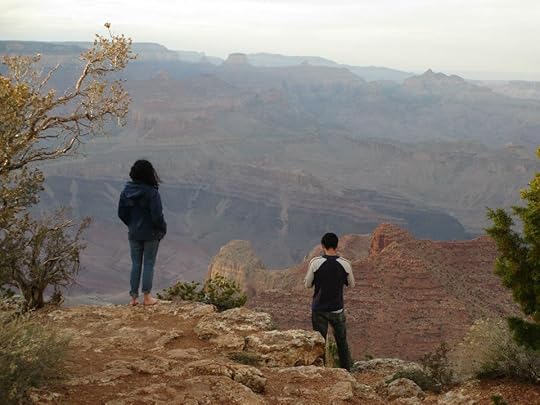
Eddie and Charlotte gazing down into the Grand Canyon for the first time.
Nomads help us see exercise and movement as a way of life, not an activity we need to schedule.
Emotional Benefits
Michael Comerford was the second hitchhiker we picked up on the side of the road. He was surviving as a carnival worker, traveling the country to work various gigs. He told me stories that I’ll never forget about how much carnival workers loved making children happy, yet the irony that most of them came from abusive childhoods and were separated from their own children. He told me about the shocking lack of education and illiteracy in the industry, and the hopeless abandonment the workers would face if they tried to leave their carnival families.
Nomads often immerse themselves into the margins of society. We see, hear, and feel those who have no voice, no words, and no education. These experiences tune us into a full spectrum of human emotions that we can then share, speak about, or write about. They come out in our art, in our music, and inject themselves into the hearts of those we come in contact with.
Back in the “real” world, when I had a real job and a real home, it was easy for me to disconnect. Routine set in, and my emotions were dulled. There was nothing new or exciting, and there was nothing to make me angry or annoyed. I had tweaked my world for maximum comfort and slipped into a state of complete moderation.
Now in a world where anything can happen at any time, I have reconnected with the way I feel about the world. From intense joy to tremendous frustration, nomads experience a wide range of human emotions on a daily basis. We are good at feeling things in a society where emotional displays are often unwelcome.
Nomads expose us to a full spectrum of human emotions that feed our sense of humanity.
Psychological Benefits
When I read Jennifer Pharr-Davis’ book Becoming Odyssa: Epic Adventures on the Appalachian Trail, I was a new nomad struggling with the concept of inactivity. Well-trained in the art of office multi-tasking and accustomed to starting each day with a “to do” list longer than my arm, I was now immersed in a world where it could take all day to do one thing. Sometimes that thing was as basic as finding a place to sleep that night.
I was starting to work on my second book, and if I wasn’t pounding away at my keyboard every spare second, I would feel guilty. The guilt puzzled me since I had no deadline, no boss, and I was writing for fun, yet those societal values of ceaseless “productivity” still lingered in my brain.
In Becoming Odyssa, Pharr-Davis wrote about her own transition from constant movement to sitting still. She describes one incident where she was at a friend’s house, just sitting there. Her friend asked if she wanted a magazine? Did she want to watch TV? But Jennifer just wanted to sit there, as she often would in the evenings on the trail, and that concept made others uncomfortable.
These days I do nothing just as often as I do something. And shockingly, it has made me more productive. I have better ideas, and when I work I am faster and more eloquent, because I have had time to organize my thoughts.
The biggest psychological stress plaguing our society is… well, stress. This goes hand in hand with the concept that we need to be doing something every minute of the day, and any minute resting is a minute wasted. Even when we do stop to rest, we are burdened by thoughts of what productive things we should be doing instead.
Rushing, multi-tasking, and stressing out are now things that only exist in my past, and that is something I learned from a nomad. In return, I seek to pass it on to others. It is a message that our society needs to make time to hear.
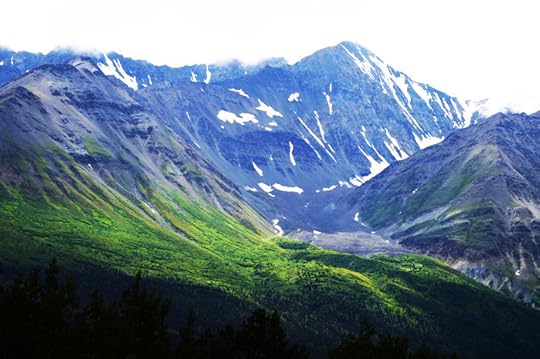
Taking it slow and drinking in the views on the Alaska Highway
Nomads encourage us to slow down and de-stress.
Survival Benefits
Residing in what is now Lebanon, the Phoenicians enjoyed a rich, civilized culture based on lumber exportation in 300 B.C. They grew to obtain great wealth due to their enormous and beautiful cedar trees, whose infamy is Biblically referred to as “the cedars of Lebanon.” Their land was plentiful, their people were strong, and their soil was rich.
The Phoenicians were self-sufficient and prosperous, but as they started to clear-cut their cedars trees over time, the quality of their soil decreased. It became harder for them to grow food, and their people started to go hungry.
The leaders of the time decided to go to war to expand their borders and rose up against Alexander the Great. Alexander squashed them like bugs and conquered their entire civilization. Historically, nations who could not feed themselves would never survive.
“Food sovereignty” is the term used to describe a nation’s ability to feed itself—a skill we are rapidly losing in our society. Socialized with the idea that if we need something we must buy it, we commit Phoenician sins at an alarming frequency.
We need people who know how to be self-sufficient. Through programs like WWOOF, many full-time nomads are learning to work organic farms in exchange for free room and board. Nomads are also experts at acquiring the things they need without using money. They barter and trade their services, goods, or skills. No matter how industrialized we become, these ancient survival skills are always useful.
Nomads bring us back to our roots of self-sufficiency, trade, and simple survival.
Irrational Benefits
Philosophically, does the constant supply of information steal our ability to imagine or replace our dreams of achieving? After all, if it is being done somewhere by someone, and we can participate virtually, then why bother leaving the house?
This is the question that Ben Saunders attempted to answer in his 2012 TED talk.
Saunders is a polar explorer and the youngest person to ever ski solo to the North Pole. He ponders his purpose of nomadic travel:
“Nothing will come of it,” he wisely admits. “We shall not bring back a single bit of gold or silver, and not a gem, nor any coal or iron. We shall not find a single foot of earth that can be planted with crops to raise food. So it is no use. If you cannot understand that there is something in man which responds to the challenge of this mountain and goes out to meet it, that the struggle is the struggle of life itself upward and forever upward, then you won’t see why we go. What we get from this adventure is just sheer joy, and joy, after all, is the end of life. We don’t live to eat and make money. We eat and make money to be able to enjoy life. That is what life means, and that is what life is for.”
Nomads understand this to be true first-hand. In a society that demands a purpose and a rational explanation for any expenditure of energy, nomads represent travel, movement, and adventure as worthwhile pursuits in themselves. Theirs are the adventures that inspire books and TED talks. This is where original ideas are born and lives are changed. There is no other job or career on earth that operates on this principle: that the destination is senseless but the journey is everything.
The benefits of living vicariously through your local nomad are also abundant. Not all of us need to ski to the North Pole, but some of us have irrational adventures of our own that we’ve muted with society’s expectations. Sometimes it takes a nomad to come along and uncover them. If we pursue those ambitions, our own adventures will inspire others, and so the circle continues.
Nomads feed our inherent sense of curiosity, wonder, and adventure; they give us permission to follow our own senseless dreams.
While nomads are not the only people on earth who benefit society in these ways, they are important, underestimated, and rare contributors. Just as some of us aspire to bring home a steady paycheck and live in comfortable homes (society needs that too), there are also nomadic spirits chained to their cubicles because they are convinced that travel would be selfish.
It is not selfish. Nomadic travel can never be selfish, because for every benefit you receive, you give away everything—your entire heart, your mind, strength, and life—to forever change the people you meet and tenderly touch the places you visit.
“To move, to breathe, to fly, to float,
To gain all while you give,
To roam the roads of lands remote:
To travel is to live.”
- Hans Christian Andersen
You May Also Enjoy:
Seeking Dispersers: A Call to Embrace a Wild Life
The Pacific Northwest: Finding Humility at the Waterfall
4 Powerful Lessons From a Nomadic Life
****
Check out my book: The Summit Seeker


July 31, 2013
Inaugural Man vs Horse Owen’s Peak Trail Marathon and 10-Miler Race Entry Giveaway
There’s a new race in town, and here’s a free entry up for grabs! The inaugural Man vs Horse Owen’s Peak Marathon (with 10 mile option) is coming to California on October 12th, 2013, with a cash prize for the winner.
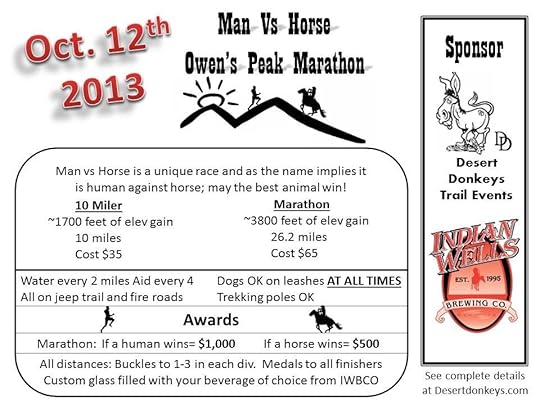
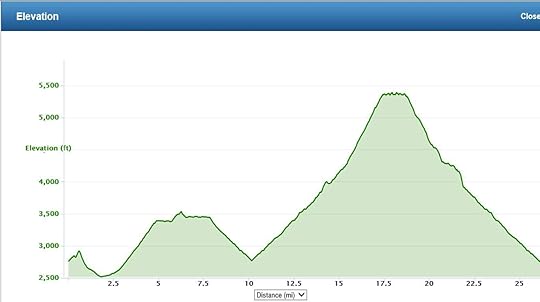
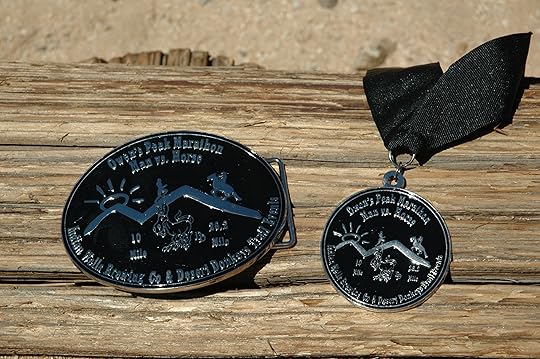
HERE is the UltraSignUp info.
HERE is the race website.
TO ENTER
For a free entry, leave a comment below answering the following question:
What is the most important thing you have learned about running in the past 12 months?
For additional entries, share this post on Facebook, Twitter, your blog, or anywhere else online. Each additional share = one extra entry. For example, if you comment below as well as share on Facebook and Twitter, that’s 3 entries. Remember to mention where you shared in the comments below.
The winner will be chosen at random on August 9th and contacted directly.
Good luck!
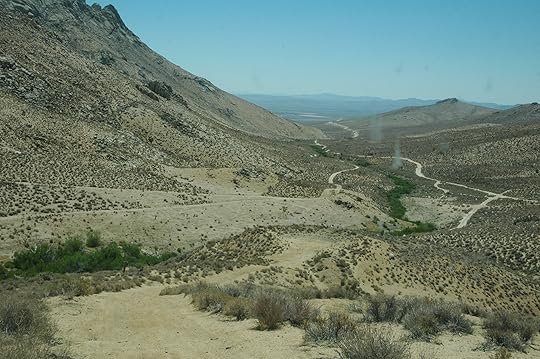
Photo from the race course
You May Also Enjoy:
Unfair Advantages in Trail Racing and Don’t Be a Douche
The Pacific Northwest: Finding Humility at the Waterfall
Are You There, Running? It’s Me, Vanessa
****
Check out my book: The Summit Seeker


July 12, 2013
Silverton 1000 Race Entry Giveaway
 I am honored and excited to offer one free entry to the Silverton 1000 in Colorado at the end of August.
I am honored and excited to offer one free entry to the Silverton 1000 in Colorado at the end of August.
The winner will receive a free entry to the race option of their choice. Choose from: 24 Hours, 48 Hours, 72 Hours, or 6-Day Challenge. Value = $145 to $400.
This race takes place at Kendall Mountain Lodge in Silverton, Colorado where race director Mark Hellenthal is doing an amazing job at drumming up excitement for things to come.
Some perks include:
Quality shirts & beanies
Free Hokas to the winners
Trail Runner magazine subscriptions up for raffle
Mind-blowing 400- and 500-mile belt buckles for the truly insane!
… and don’t forget the automatic entry to the 1000 Mile Challenge for all 6-day runners (you’ll have 18 days to cover 1000 miles)!
Learn more on the UltraSignUp Registration page HERE.
Visit the race website HERE.
Visit the race Facebook page HERE.
TO ENTER
Simply leave a comment below answering the following question:
“What is the funniest thing that has ever happened to you during a race?”
For additional entries, share this post on Facebook, Twitter, your blog, or anywhere else online. Each additional share = one extra entry. For example, if you comment below as well as share on Facebook and Twitter, that’s 3 entries. Remember to mention where you shared in the comments below.
The winner will be chosen at random on July 19th and contacted directly.
Happy Trails!
You May Also Enjoy:
Unfair Advantages in Trial Racing and Don’t Be a Douche
Are You There, Running? It’s Me, Vanessa
****
Check out my book: The Summit Seeker


July 11, 2013
Happy Birthday Shacky
For the past several weeks, Shacky and I have been watching Dr. Who episodes every night before bed. We are almost caught up and the seasons are getting better as we go along. I wasn’t a fan of the early female companions who kept falling in love with the Doctor, acting clingy and helpless.
Why does everyone fall in love with the Doctor?
I concluded it was the lure of travel, the intoxication of being whisked off to a new and exciting place, and the thrill of making things up as you go along.
Today is Shacky’s birthday and I realize those things have also come to describe our lives. In the tardis RV, Shacky takes me to cool places and neither of us really know what we’re doing. Time has also changed for us. Celebrating Shacky’s birthday last year in San Diego feels like a lifetime ago.
Below is a birthday video I put together for Shacky. Here’s to many more years on the road!
SHACKY’S BIRTHDAY VIDEO
Direct YouTube link HERE
You May Also Enjoy:
Happy Hoboversary! Stats From One Year Later
10 Overlooked Rights Worth Fighting For
****
Check out my book: The Summit Seeker


July 6, 2013
Our Second Hitchhiker
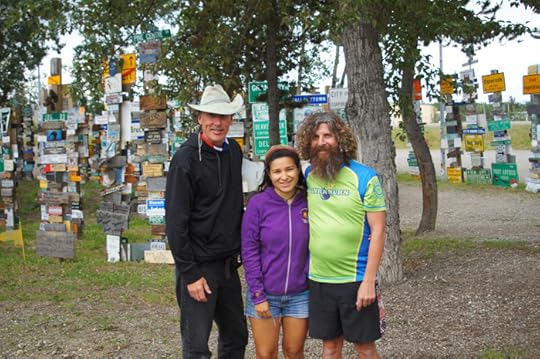
with hitchhiker Mike
This week we had the honor of picking up our second hitchhiker off the side of the road. We saw him as soon as we drove into Fort St. Nelson in the evening, but we were stopping to spend the night. I hoped he could get a ride (there weren’t many cars going North), but decided we’d give him a ride tomorrow if he still needed one.
We found a place to park the RV for the night and got on with our evening ritual of watching Dr. Who episodes before bed. A couple hours later, I noticed the hitchhiker walking down the street, alone and defeated looking for a place to spend the night. I made a mental note to look for him the next day.
He was a tall, lanky dude in his 50s wearing a heavy backpack and a black t-shirt. The next day we discovered that the shelter in town was full, so he had spent the night in the announcer’s box of the local baseball diamond, trying to fight off mosquitos. In this part of the world, the sun comes out at 2 to 3 a.m. and he was hoping for a ride until about 11 p.m., so he didn’t get much sleep.
Shacky and I drove into the Visitor’s Centre to use the bathroom and get some wifi before starting our commute. We spotted the hitchhiker on the side of the road again, and took bets on whether or not he would still be there when we came out of the bathroom.
When I got out of the bathroom, I found him already talking to Shacky. His name was Mike and he was a writer. He had worked as a newspaper reporter for most of his life, and now had a blog on Huffington Post. He was on a one-year mission to work at as many traveling carnivals as he could, currently on his way to Anchorage to see if he could work there (it would be his 3rd carnival).
Mike had no other income other than what the carnivals paid, which was less than minimum wage. His plan was to blog about his journey and publish a book about it at the end of the year. I packed a food bag for him, and he ate while we drove.
Mike told us all about his travels, the people he had met along the way, and asked lots of questions about our own lifestyle. He scribbled notes into a tiny notebook and helped us keep track of the wildlife we saw. He was bright and eloquent with some fantastic stories.
He described the majority of carnival workers as very poor, uneducated individuals (many not having finished grade school, and a few who could not read), eager to drink and party but also extremely hard workers who found joy in helping kids have fun. The irony was that many were away from their own families and children, and some had joined the carnival to escape their families (mostly abusive).
Instead of giving away Mike’s stories, I’ll encourage you to check out his carnival blog and follow his travels HERE.
We drove to Liard Hot Springs, where Shacky and I had planned to spend the night after a good soak. Mike wanted to continue his journey, so we said our goodbyes.
After dipping into the warmest hot spring I have ever experienced, Shacky decided he wanted to keep driving. Mike was still waiting for a ride, so he hopped back in and we drove to Watson Lake. We were definitely spending the night in Watson, so that was the last time we saw Mike. When we get to Anchorage, we’ll look for him at the local carnival.
Every hitchhiker we pick up confirms my suspicion that strangers are inherently awesome, trustworthy, and good human beings. I read on a blog somewhere (I wish I could remember names to reference it) about a woman who hitchhiked all over the world, and insisted it was one of the safest things she had ever done. She said that all the men warned her about other dangerous men, believing that they were the exceptions; each of them convinced that most people could not be trusted. We distrust our neighbors, and our neighbors distrust us, but dangerous men are more of a minority than we believe.
This does not mean that we should not be vigilant, aware of our surroundings, or that bad people do not exist. I just wish—with years of “don’t talk to strangers” ingrained in my upbringing—that I had spoken to a few more along the way.
Read Shacky’s account of our hitchhiker encounter HERE.
You May Also Enjoy:
Answering the Call of the North
Seeking Dispensers: A Call to Embrace a Wild Life
****
Check out my book: The Summit Seeker


June 29, 2013
Unfair Advantages in Trail Racing and Don’t Be a Douch
In elementary school, I had a teacher who gave the same response to every child who opened their mouth to complain. “Life’s not fair,” she would chirp with a grin, thrilled to be the first to inform us of this great life truth. The offending child would roll his eyes, and know his argument would fall on deaf ears. I can still hear that teacher’s voice in my head whenever I encounter complaints.
I heard her voice again when I read this month’s Trail Runner Symposium topic:
What constitutes an “unfair advantage” in a trail race, and what—if anything—should be done to even the playing field?
It’s not a topic I had previously considered, and frankly I was surprised at its origin. Associate Editor Yitka Winn wrote that the topic was “inspired by a recent letter to the editor we received complaining about the ‘unfair advantage’ of using a pacer in ultras.”
Huh?? Someone got their panties in a knot about pacers?
But when I started looking, I realized that “unfair advantages” were everywhere. Let’s explore this, shall we?
First, it’s important to consider that while there are advantages, not all advantages are unfair. For example, if one runner takes caffeine and another runner does not, the caffeinated runner may have an advantage. However, it’s not fair because: a) It is not against the race rules b) anyone can do it.
Here is a simple flow chart to determine whether or not an advantage is unfair:
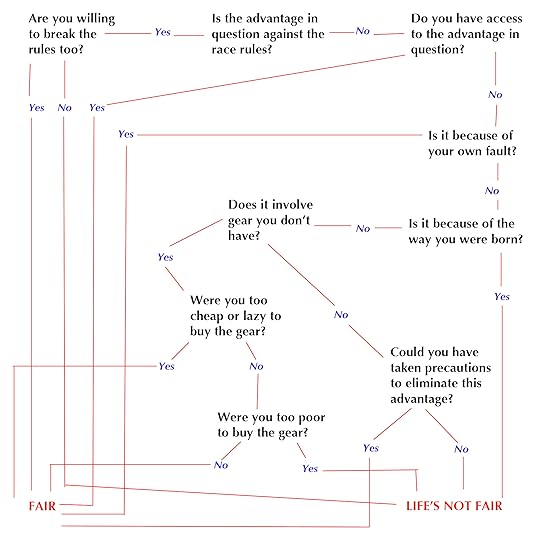
Now here is where it gets tricky. Once you’ve determined that you have an unfair advantage on your hands, that does not necessarily mean that you have a good case.
Here is a simple flow chart to determine whether or not you should take your unfair advantage argument to the authorities.
Sidenote: You may want to consider that the closer you are to the back-of-the-pack, the douchier you sound when complaining about unfair advantages.
Here is a graph for reference:
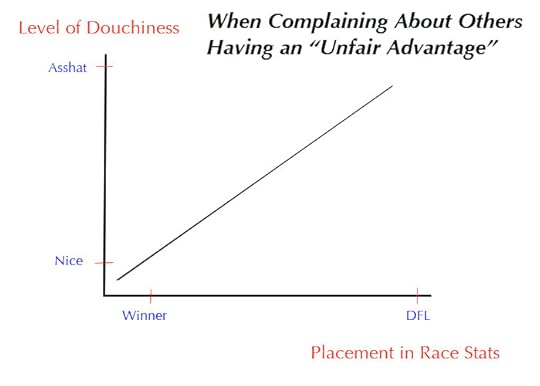 Sidenote 2: There are some cases where a runner will complain about the “unfair advantages” given to runners with disabilities. These may include things like hiking poles, pacers, guide dogs, or “bouncy” prosthetics. (Yes, this really happens.) If you complain about these perceived unfair “advantages,” you risk a higher likelihood of being placed in the special category of “Extreme Asshat.” Sightings are rare, but not as rare as you’d like.
Sidenote 2: There are some cases where a runner will complain about the “unfair advantages” given to runners with disabilities. These may include things like hiking poles, pacers, guide dogs, or “bouncy” prosthetics. (Yes, this really happens.) If you complain about these perceived unfair “advantages,” you risk a higher likelihood of being placed in the special category of “Extreme Asshat.” Sightings are rare, but not as rare as you’d like.
The bottom line is that there will always be someone who has an advantage over you in a trail race, and if you’re the type of person who spends time trying to figure out which details are unfair, I fear you may be in for some needless mental agony and resentment.
The solution for me has been to compete with a past version of myself. I hope to be better than yesterday, and tomorrow I will push myself even further. That’s fair enough.
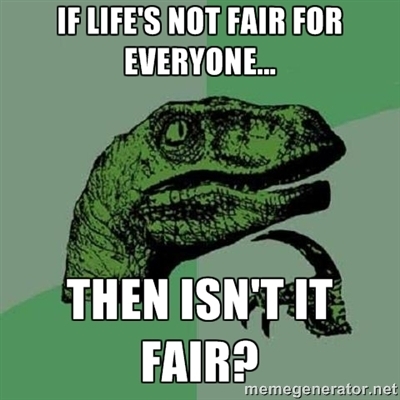
This post is part of the TrailRunner Blog Symposium.
Social Media: Bane or Boon to Trail Running?
4 Powerful Lessons From a Nomadic Life
Seeking Dispensers: A Call to Embrace a Wild Life
****
Check out my book: The Summit Seeker


June 24, 2013
The Pacific Northwest: Finding Humility at the Waterfall
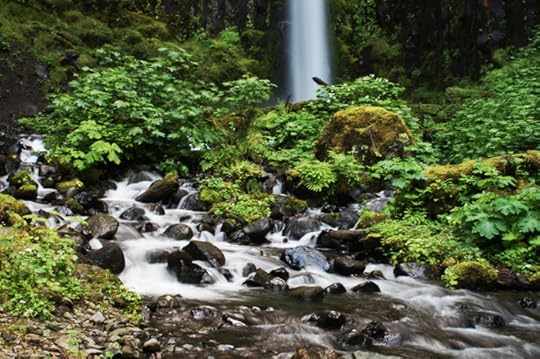
Cascade Falls, Pacific Coast Trail
It is late morning on the Pacific Coast Trail—a sunny but cool day under the vast shade of the forest. We are in Oregon, a few miles away from the Bridge of the Gods, where the PCT crosses and continues past the Washington border. We’ve been on the trail all morning, and are now taking a break at Cascade Falls, less than a mile off the PCT. Apart from a lady taking pictures with an elaborate tripod and camera set up, we are all alone. Shacky throws a stick for Ginger while I soak my legs in the water and rub off the layers of dirt that cling to my calves.
Suddenly, I turn my head at a noise that sounds like a car. Huh? It can’t be. We’re on the PCT! But when I look up, I do indeed see a car inching its way up the trail. Although the dirt road is wide enough for a small car, it’s not a road that goes anywhere—it dead ends at the falls. I don’t even know where a car could have been coming from? These people must be very, very lost.
I mentally prepare to give some directions, but the car doesn’t stop. Nobody jumps out. They see the falls, the rocks, and the dead end, but they keep driving up to the water, spreading noise and fumes and blocking off the entire trail. What the hell are these people doing??
Then I understand—they’re trying to drive as close as possible to the falls so they can either see the view from their car, or walk as little as is humanly possible. On the final steep and rocky incline (for a car, anyway), they give up and park it. Out of the car stumble a trashy looking couple with their kid. I can’t believe they drove here.
The kid, about six years old, is in heaven. She runs right up to the falls and wants to play. The mother wanders off while the dad stands to the side and smokes a cigarette. They stay for about three minutes before calling the kid back to the car. After they leave, I am horrified to discover the dad’s discarded cigarette butts all along the water.
Most of the time, the people we meet on the trail are happy, respectful, and kind, but every once in a while we meet people who make me wonder if they deserve to be there. When the trails feel like home, I find myself feeling more protective of them and highly disgusted by those who aren’t respecting the land, or didn’t exert any effort to get there.
It used to be that you couldn’t see the views if you didn’t put in the miles or make the climb on your own two feet, but that’s not always the case in the modernized wilderness of today’s tourist hot spots. Sometimes I wonder about the balance between getting more people out in nature, and making it just a little too easy for them.
The douchey couple incident stayed with me for a few days, scratching on my brain like fingernails on a chalkboard. What the hell is wrong with people?? I huffed to myself as I ran up a hill. Those guys should not even be allowed in nature!
But then I thought about their young daughter, and the three minutes of joy she had playing at the base of that waterfall. I wonder if she’ll grow up to remember her fleeting moment as “that day we went hiking,” and seek out more days like it. Perhaps someday this trail will see her running through it, soaking her legs in the falls, and feeling protective of its beauty.
More importantly, who was I to judge who “deserved” to be on the trail? Was Trail Police really a job I was cut out for? It seemed to take my mind to a place I couldn’t enjoy—one of judgment, condescension, and perpetual annoyance.
A few days later, I was running alone up the Wahkeena Falls trail on the scenic Columbia River Gorge. We had already run that morning, but I couldn’t get enough of this place. Shacky was resting in the RV, so I started off with just Ginger. Before long, she was slowing down in the heat of the day and the perpetual climbs, so I took her back to the RV and started for the third time on my own.
The falls themselves are a short walk from the parking lot, up a paved “trail”. Most people just hike to the lookout for pictures, but if you continue up the trail, there are more lookouts and waterfalls as the road becomes significantly steeper, no longer paved, and more technical. That’s where I was heading.
After getting my miles in, I was bounding back down the switchbacks and hit the crowds at the waterfall again. Taking up most of the space was an extremely obese family of four. The two pre-teen children were huge, and their parents looked like they might roll away. I stopped to watch them more closely. Did they look like the kind of people who would leave junk food wrappers all over the trail, or flick a cigarette over the falls? Did they “deserve” to be there?
The longer I watched them, the bigger the smile grew on my face. They were elated. All of them were looking at the falls like it was the hidden wonder of the world. The kids shouted and laughed while the mom stuck her arm out for a selfie photo on her camera phone, her face beaming with gratitude.
I was humbled.
I had seen this waterfall three times already. Where was my beaming face? Where was my boundless joy?
I was polishing off a 50-mile week to get to this point, and these guys had just walked a few hundred feet, yet we were both in the same place. In the end, I had advanced no further and done no better. We were both on the same trail, both hot and sweaty, and both of us had gotten out of bed that day and put on our running shoes. Over food or comfort or television, we had both chosen the waterfall.
John Muir once wrote that nature should be explored by “anyone with the right manners of the wilderness,” and I think that sometimes the wilderness itself extracts that respect from us, whether or not we have experience giving it.
Oregon so far has been my favorite state to run in. I have been both humbled and exalted by its towering trees, lush forests, and clean air. The state motto reads: alis volant propriis. It means, She flies with her own wings.
What if we are all just flying the trails in our own time, with our own wings, in different stages of our relationship with the wilderness? Some of us are just starting out, while others are growing old on these trails.
That obese family may not have walked to many waterfalls, but they knew what to do in the presence of this one. Maybe their journey was just starting.
Maybe—in some way—we all deserve to be here. Or more likely, none of us deserve this. Yet day after day, by some great mercy, the sun still rises and the water still falls.
For all of us.
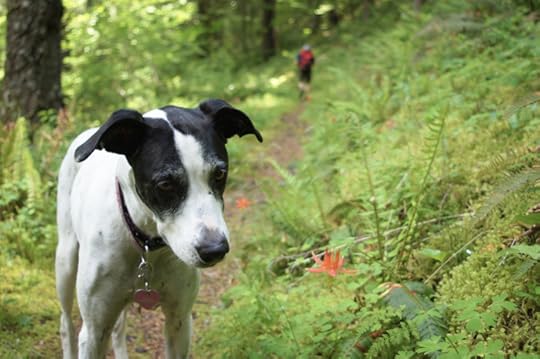
Pacific Coast Trail
You May Also Enjoy:
Are You There, Running? It’s Me, Vanessa
Sequoia National Park: Finding Resilience in the Forest
Answering the Call of the North
****
Check out my book: The Summit Seeker



